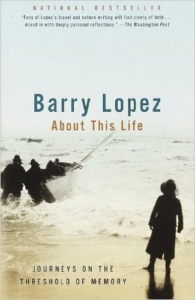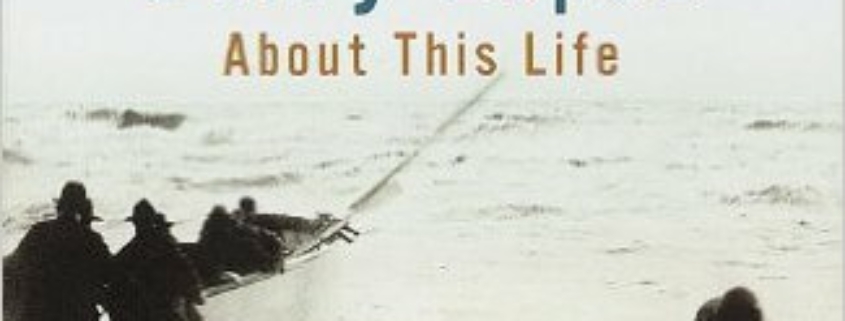Writers Read: About This Life by Barry Lopez
 In the introduction to his essay anthology, About This Life: Journeys on the Threshold of Memory, Barry Lopez describes becoming a writer and finding his voice. He writes of the universality of story in all cultures, a binding theme in this collection: “Stories do not give instruction, they do not explain how to love a companion or how to find God. They offer, instead, patterns of sound and association, of event and image. Suspended as listeners and readers in these patterns, we might reimagine our lives. It is through story that we embrace the great breadth of memory, that we can distinguish what is true, and that we may glimpse, at least occasionally, how to live without despair in the midst of the horror that dogs and unhinges us.” (13)
In the introduction to his essay anthology, About This Life: Journeys on the Threshold of Memory, Barry Lopez describes becoming a writer and finding his voice. He writes of the universality of story in all cultures, a binding theme in this collection: “Stories do not give instruction, they do not explain how to love a companion or how to find God. They offer, instead, patterns of sound and association, of event and image. Suspended as listeners and readers in these patterns, we might reimagine our lives. It is through story that we embrace the great breadth of memory, that we can distinguish what is true, and that we may glimpse, at least occasionally, how to live without despair in the midst of the horror that dogs and unhinges us.” (13)
Lopez proceeds to give us the most beautiful stories from his travels around the world, stories of exploration, of nature in the crosshairs, of his own personal embrace of memory. His lyrical, metaphorical prose is on display in these essays, and his existential discoveries resonate.
“Stories do not give instruction, they do not explain how to love a companion or how to find God. They offer, instead, patterns of sound and association, of event and image. Suspended as listeners and readers in these patterns, we might reimagine our lives…”
Part one of this anthology includes essays from travel abroad, to the extreme reaches of humanity: Bonaire, the northern tip of northernmost Japan, Galapagos, Antarctica. In Bonaire, Lopez wrestles with the juxtaposition of the “conspicuous wealth of… visitors” (30) against the poverty and “praying mantis economy” (22) of the native Bonaireans. “The contrast between a desiccated land and the rococo display of life in the sea, between hardscrabble existence on tenuous farming land holds and the burgeoning growth of condominiums to provide housing for divers like myself made sleep difficult” (23). In Galapagos, Lopez again explores juxtapositions, this time of abundant life and “violent death” (64): “Images of innocent repose and violence are never far apart… and the visitor is nowhere spared the contrast. He or she scans the seascape and landscape… acutely aware of the light hold the biological has on the slow, brutal upheaval of the geological” (58).
In Hokkaido, Japan, Lopez transcends the language barrier to find common interest in birds and nature with an elder. He explores communication without translation. Challenged to “rekindle the ancient relationship of interdependence between man and animal” (48), he accepts the gift of a feather from the elder: “Here, in an owl’s long flight feather, is the illiterate voice of the heart” (49). Even further into the extreme, Lopez visits Antarctica to experience the desiccated remains of errant wandering seals, preserved for decades by cold and lack of scavengers. Of the seals he writes: “They were inconsolable. They had made an error. Their lips parted in some final, incoherent noise. They had, most of them, died alone. Some lay with the clouded eyes of the blind, preserved for years in abject disbelief” (71). Finally, Lopez journeys through time by hopping commercial flights in rapid succession in “Flight,” an existential rumination of space and time. He discovers “that time pooled in every part of the world as if in a basin. The dimension, the transparency, and the agitation were everywhere different” (107). These lyrical passages delve further than the boundaries of travel writing usually permit. Lopez’s particular skill with language allows it.

Barry Lopez, photo by David Liittschwager
In part two, we journey with Lopez in America, the place of “landscape and memory” (143), exploring how humans and animals intersect. In “Apologia” he writes of his habit of stopping his car to remove roadkill from the road. “We treat the attrition of lives on the road like the attrition of lives in war: horrifying, unavoidable, justified. Accepting the slaughter leaves people momentarily fractious, embarrassed” (116). In Lopez’s “In a Country of Light, Among Animals,” an essay about summer in Alaska’s Brooks Range, he circumvents anthropomorphizing (while writing about it) by calling each species by its native name. Brilliant. He writes of native people whose cultural memory of animals is generational, people who “examine intuitive and personal feelings about wild animals with no fear of anthropomorphism” (121). In such a place, “one’s prejudices in favor of a superior Western system of knowledge are so obvious, so racist, they bring conversation to a halt” (121).
With “The American Geopraphies,” Lopez explores the dangers of a national geographic identity, and implores us to seek and know our local geography. And in “Effleurage” and “The Whaleboat,” Lopez examines the relationship between people, place, and objects, through the physical art of pottery in the former, and his own connection to the land around his home and his relationship to his writing room in the latter.
In parts three and four, Lopez delves further into the personal, into the poetry of memory and the landscape of a life, “wondering more than anything at the way memory, given so little, could surge so unerringly” (200). In “A Passage of the Hands,” Lopez explores texture, physical contact and how touch inspires and bridges memory. “It’s easy to see that the education of the hands (and so the person) begins like a language: a gathering of simple words, the assembly of simple sentences, all this leading eventually to the forging of instructive metaphors” (213)—a metaphor to describe a metaphor. He asks his hands, his scars, to reminisce. From his hands to the lens in “Learning to See,” about Lopez’s research and experience with landscape photography, he works at “regaining the feeling that one is not cut off from the wellsprings of intelligence and goodwill, of sympathy for human plight” (238).
With control of language, with metaphor and image-rich lyrical narrative, Lopez allows us to journey with him through literal and cognitive geographies.
Finally the beautiful snapshot essay, “Death,” at the beginning of part four, about discovering mortality as a child through the death of Lopez’s dog. “Afterward I sat in the shade underneath the eucalyptus, a space emptied by the absence of the dog, looking at the spot in the road where we had been. I did not find him. No one I asked said. I did not know where the dog was. Ever” (245). The voices of the child and of the writer meld here in lyrical alchemy.
This essay collection transcends genre and crosses the borders of travel narrative, landscape essay, memoir, and poetry. With control of language, with metaphor and image-rich lyrical narrative, Lopez allows us to journey with him through literal and cognitive geographies. Never sentimental, Lopez’s strong voice guides us to the unknown and to the universal truths. Such beauty, trying to live without despair, with grace: “The weight I wish to fall I cannot fathom, a sorrow over the world’s dark hunger” (118).
Lopez, Barry H. About This Life: Journeys on the Threshold of Memory. New York: Vintage Books, 1999. Print.

Katelyn Keating believes the Tolkien mantra, “Not all those who wander are lost.” She also concurs with Agent Mulder regarding the location of the truth. She mixes metaphors. Hailing from New England, Katelyn lives in St. Augustine, Florida with her husband, two dogs, three cats, and a few of her parents. She is a MFA student in creative writing at AULA. She currently serves on Lunch Ticket as Co-Editor for Creative Nonfiction and the Diana Woods Memorial Award and will be the upcoming Editor-in-Chief in 2017.





